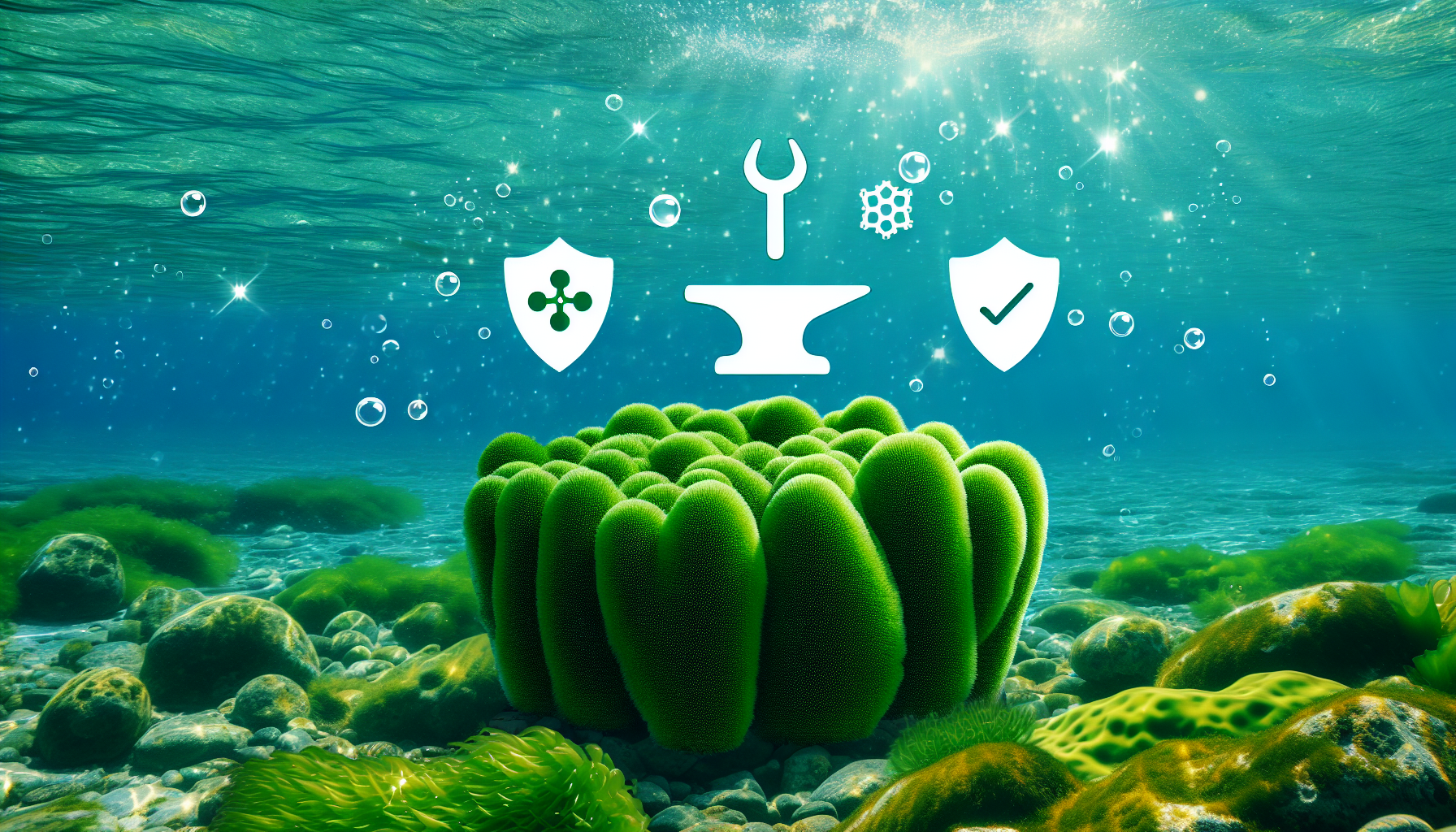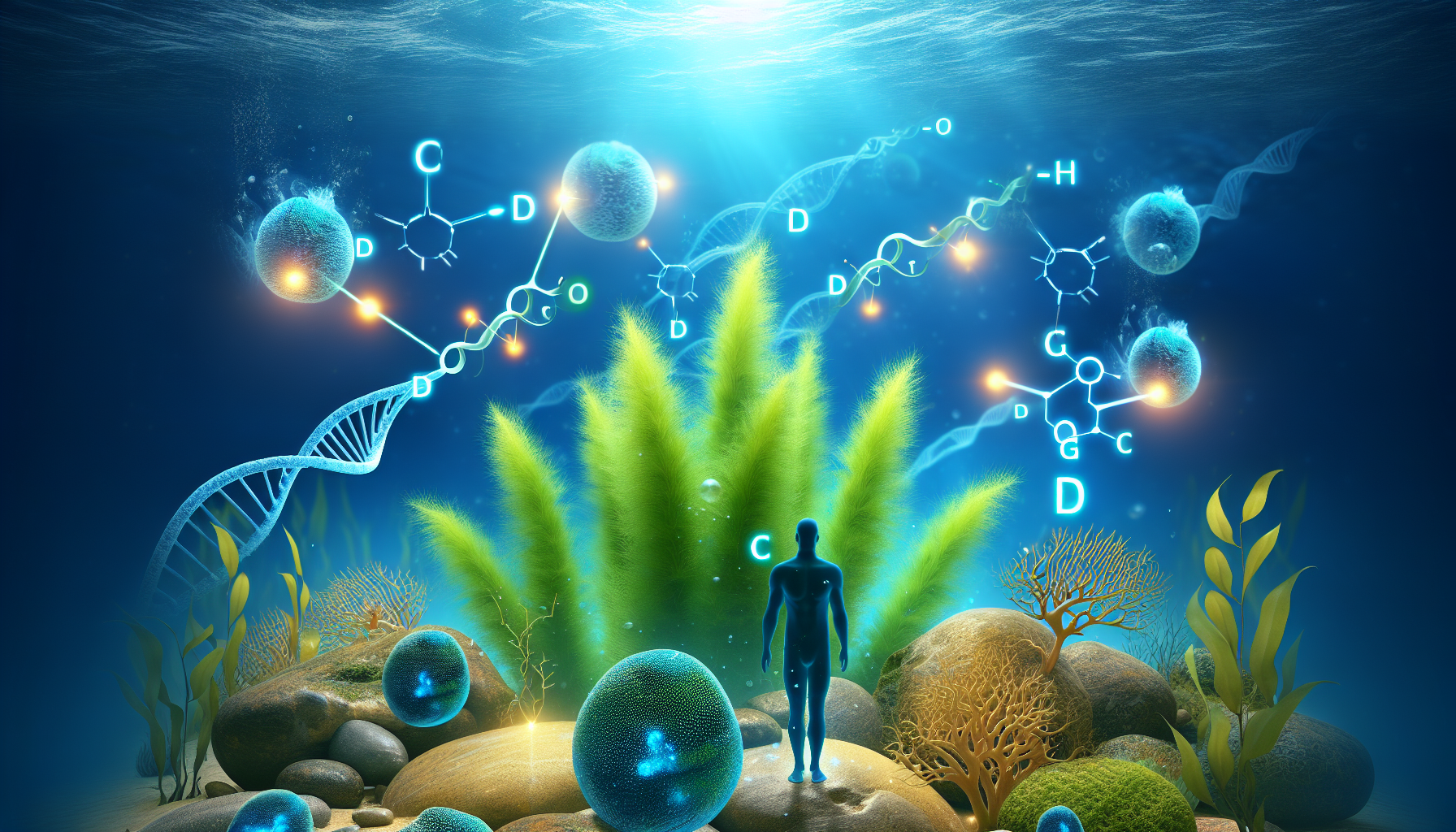Exploring Sea Moss Health Benefits: A Comprehensive Guide
Are you curious about the health benefits of sea moss? This marine superfood is praised for its vitamins and minerals that may enhance thyroid function, support gut health, and bolster the immune system. While many enthusiasts swear by its wellness advantages, scientific research is still catching up. Dive in as we explore the reality behind sea moss health benefits, guiding you through what’s proven, what’s possible, and how to integrate it into your diet.
Key Takeaways
- Sea moss, also known as Irish moss, is rich in an array of nutrients including vitamins, minerals, and polyunsaturated fats; however, scientific evidence confirming its health benefits is still emerging and more human clinical trials are needed.
- Excessive consumption of sea moss can lead to an imbalance in iodine intake, potentially causing thyroid dysfunction, and there’s a risk of heavy metal contamination if the sea moss is sourced from polluted waters.
- While sea moss supplements are convenient and nutrient-rich, they should be consumed with caution due to potential side effects and the importance of choosing supplements from reputable sources to minimize risks.
Unveiling the Health Benefits of Sea Moss

Sea moss, or Irish moss, is a type of red seaweed that is a treasure trove of nutrients, offering:
- Vitamins
- Minerals
- Polyunsaturated fats
- Anti-inflammatory compounds
A small serving is low in calories and sugar, packs a bit of protein, and is nearly fat-free. However, while the purported health benefits of sea moss are many, scientific evidence to back these claims is still in its infancy.
From supporting thyroid function to enhancing gut health and bolstering the immune system, sea moss is touted to offer a spectrum of health benefits. But, it’s important to remember that these potential benefits are largely based on animal and in vitro studies. Hence, more comprehensive human clinical trials are necessary to confirm these claims.
Boosting Thyroid Function
Sea moss is a potential supporter of thyroid health due to its richness in iodine, a key element for synthesizing thyroid hormones that regulate metabolism, heart rate, and breathing. Nevertheless, it’s not entirely beneficial.
Excessive iodine intake, or too much iodine, from high levels found in some sea moss supplements can lead to thyroid dysfunction and may even increase the risk of thyroid cancer. While sea moss contains iodine, it generally has lower levels compared to kelp, making it a suitable alternative for those with specific iodine intake requirements. Medical advice is a must if you are considering using sea moss for thyroid health management, particularly if you are currently on thyroid medication.
Enhancing Gut Health

Sea moss may contribute to your overall health by supporting gut health, which is fundamental for your well-being. Sea moss contains prebiotic components that can improve gut health by promoting the growth and activity of beneficial gut bacteria. This presence of live bacteria and fiber in sea moss aids in replenishing the gut’s good bacteria and maintaining a healthy bacterial balance.
A healthier gut microbiota, influenced by the prebiotic effect of sea moss, is associated with better weight management and metabolic function. So, while sea moss isn’t a magic elixir for gut health, it can serve as a beneficial addition to a balanced diet.
Strengthening Immune System

Your immune system is your body’s defense mechanism against illnesses and infections, and it needs a variety of nutrients to function optimally. Enter sea moss, which is rich in iron and antioxidants, essential for maintaining immune health.
Although consumption of sea moss gel is thought to potentially bolster the immune system, this claim is currently under scientific scrutiny and demands additional research. In fact, claims about sea moss’s ability to strengthen immunity and provide other health benefits like skin clarity and fertility enhancement are largely based on anecdotal evidence and lack comprehensive scientific support.
Sea Moss for Lungs

Respiratory health is paramount, and sea moss may offer some benefits in this regard. Sea moss contains compounds that have anti-inflammatory properties and the ability to thin mucus, potentially improving lung health.
Despite these potential benefits being promising, please keep in mind that extensive human studies are still needed to understand the effects of sea moss on lung health. Therefore, while including sea moss in your diet may have potential benefits, it should not be used as a substitute for appropriate medical treatment for lung conditions.
Sea Moss for Diabetes

Diabetes is a global health concern, and any potential natural aids in blood sugar regulation are worth exploring. While it’s not a silver bullet, sea moss may offer some benefits in this area. Some animal and in vitro studies suggest that sea moss may help regulate blood sugar levels.
These findings, however, are preliminary and further research is required to confirm sea moss’s effectiveness in managing diabetes in humans. Until then, it’s best to follow standard diabetes management protocols and consider sea moss as a potential supplement, not a replacement for proven treatments.
Sea Moss for High Blood Pressure
High blood pressure is a serious health concern that can lead to heart disease and stroke. Sea moss, being a source of potassium, may potentially help lower high blood pressure. Nevertheless, the research backing this claim is scarce and more studies are required to verify sea moss’s effectiveness in managing high blood pressure.
Additionally, individuals on blood-thinning medication should avoid sea moss due to its potential to enhance blood-thinning effects.
Supporting Weight Loss Efforts
The quest for natural aids in weight loss has led many to explore the potential benefits of sea moss. Being a high-fiber food, sea moss may contribute to prolonged feelings of fullness, helping to reduce overall calorie intake.
Moreover, sea moss can enhance weight loss efforts in the following ways:
- Carrageenan, a natural compound found in sea moss, can mimic soluble fiber in the digestive system, increasing fullness and potentially decreasing body fat.
- Sea moss should be viewed as a supplementary tool, not a singular solution, for weight loss.
- Weight loss is a complex process that necessitates a balanced diet coupled with regular physical activity.
Sea Moss Supplements: Pros and Cons
While sea moss can be consumed in its natural form, sea moss supplements offer a convenient, tasteless option for dietary inclusion. Available in forms like:
- gels
- powders
- capsules
- gummies
These supplements can be a great way to reap the potential benefits of sea moss without the hassle of preparation.
However, it’s not all smooth sailing. Sea moss supplements can have inconsistent amounts of nutrients and may contain contaminants like heavy metals. Moreover, potential risks include the possibility of excessive iodine intake, which could lead to thyroid dysfunction, and heavy metal contamination, particularly when harvested from polluted waters. Hence, sourcing sea moss supplements from trusted suppliers and using them responsibly is a must.
The Good: Nutrient-Rich and Convenient
Sea moss supplements are nutrient powerhouses, providing a wide array of vitamins and minerals. A sea moss supplement can include:
- Iodine
- Antioxidants
- Folate
- Vitamin K
- B-vitamins
- Iron
- Magnesium
- Zinc
- Calcium
These nutrients are essential for overall health and a robust immune system. Sea moss supplements also contain the amino acid taurine, which aids muscle-building and recovery, and offer about 6 grams of protein per 100 grams.
Furthermore, sea moss supplements are a convenient addition to any diet. They can be easily integrated into diets in various forms and can be mixed with other ingredients for additional health benefits. Some ways to consume sea moss supplements include:
- Consuming it directly in gel form
- Adding it to smoothies
- Mixing it into oatmeal
- Adding it to soups
These options make it easy to incorporate sea moss into your daily routine and enjoy its health benefits.
The Bad: Potential Risks and Side Effects
While sea moss supplements offer a convenient and nutrient-rich addition to your diet, they also come with potential risks. Excessive consumption can lead to an iodine imbalance, potentially causing thyroid health implications such as goiter, thyroid cancer, and impaired thyroid hormone production. Overconsumption can also cause stomach upset, manifesting in symptoms like nausea, vomiting, and diarrhea.
Moreover, due to sea moss’s ability to absorb heavy metals from its environment, there’s a risk of heavy metal contamination, especially when sourced from polluted waters. Hence, it’s advisable to use sea moss supplements responsibly, ensuring moderate consumption and sourcing from trustworthy suppliers.
Incorporating Sea Moss into Your Diet
Incorporating sea moss into your diet can be as simple or as creative as you want it to be. Here are some ideas:
- Use its gel to naturally thicken jams, soups, and porridges
- Replace gelatin in desserts with sea moss
- Use sea moss as a binder similar to an egg in various recipes
When you dive into the culinary world, expect sea moss, specifically, to offer a world of possibilities in the kitchen, including learning how to prepare sea moss.
You can also add sea moss to smoothies for an extra nutrient boost. For example, a watermelon and sea moss smoothie is a refreshing, nutrient-packed beverage that’s perfect for a hot summer day. If you prefer something warm, sea moss can be added to soups towards the end of the cooking process to prevent nutrient loss due to boiling.
Sea Moss Gel: A Versatile Addition
Sea moss gel is a versatile ingredient that you can easily make at home. To make the gel, you need to rinse dried sea moss thoroughly, soak it in spring water, and blend it until it reaches a smooth, creamy texture. The ready-made gel can be stored in an airtight container in the refrigerator for up to one month.
With its gelling, thickening, and stabilizing properties, sea moss gel can be used in a variety of dishes. You can add it to your smoothies, sauces, and soups, or use it to create nutrient-rich acai bowls and homemade ice cream. To further enhance the nutritional profile of sea moss gel, consider adding ingredients like bladderwrack or elderberry, which contribute additional nutrients.
Raw Sea Moss: Preparing and Consuming
If you prefer to consume sea moss in its most natural form, raw sea moss is an excellent option. Before use, raw sea moss must be rinsed and soaked to ensure cleanliness and to remove any sea-like smell. Once prepared, it can be added to various dishes for a nutrient boost.
For instance, you can add raw sea moss to salads for a unique texture and taste. Or, you can create a sea moss soup, adding the moss at the end of the cooking process to prevent nutrient loss due to boiling. Whether you choose to consume it raw or cooked, sea moss is a versatile ingredient that can be easily incorporated into your diet.
Comparing Sea Moss to Other Seaweeds
Like sea moss, other seaweeds such as kelp, wakame, and dulse offer a bounty of nutrients and potential health benefits. Each type of seaweed has a unique nutrient profile and culinary uses, making them a valuable addition to a balanced diet.
Sea moss, for instance, is rich in protein, vitamins, and key amino acids, while kelp is especially high in iodine, potassium, and calcium. On the other hand, wakame, a brown seaweed, is known for its significant amount of omega-3 fatty acids, contrasting with sea moss’s high mineral content.
Brown Seaweed: Kelp, Wakame, and Fucus
Brown seaweeds like kelp and wakame are rich in vitamins, minerals, and antioxidants. Kelp, for example, thrives in cooler waters and is especially high in iodine, potassium, and calcium. Wakame, on the other hand, is commonly used in salads and miso soup and is appreciated for its nutrient content, which includes vitamins, minerals, and antioxidants.
Fucus, another brown seaweed, is known for its potential weight loss benefits. Similar to sea moss, fucus is rich in iodine and can support thyroid health. Like sea moss, though, excessive iodine intake from fucus can also pose a threat to thyroid health.
Red Seaweed: Nori, Dulse, and Agar
On the red seaweed front, we have:
- Nori: commonly used as a wrap for sushi, is rich in a variety of vitamins, including A, B, C, D, E, and K, and is also a source of protein and iron.
- Dulse: offers high levels of potassium and iron, sharing similarities with sea moss in terms of essential micronutrients and culinary versatility.
- Agar: commonly used as a vegetarian substitute for gelatin, is a good source of fiber and can be used to make jellies, custards, and other desserts.
Agar, another red seaweed, is popular in plant-based diets as a vegan alternative to gelatin. It shares sea moss’s gelling properties, making it an excellent option for thickening and stabilizing foods. Whether you choose sea moss or other types of seaweed, you’re sure to get a boost of oceanic nutrients.
Addressing Common Myths and Misconceptions
In the world of nutrition, it’s not uncommon for certain foods to be surrounded by myths and misconceptions. Sea moss is no exception. While it’s packed with beneficial nutrients, the claims surrounding its health benefits are not heavily studied, leading to a prevalence of unfounded claims.
There is limited scientific evidence to prove many of the health claims associated with sea moss, emphasizing the need for more research. Thus, while sea moss could be a positive addition to a balanced diet, one should view its alleged health benefits with discernment and considerable skepticism.
The Carrageenan Controversy
One of the most controversial aspects of sea moss is its carrageenan content. Carrageenan, a natural compound found in sea moss, is often confused with poligeenan, a potentially harmful substance. This confusion has led to misunderstandings about the safety of carrageenan.
Poligeenan, created by processing carrageenan with acid, is linked to health risks like gut tumors and ulcers. In contrast, food-grade carrageenan is deemed safe for consumption. Despite some concerns about the potential for food-grade carrageenan to degrade into poligeenan in the human digestive system, no conclusive evidence has been found, and the current scientific consensus deems carrageenan safe for consumption.
Sea Moss as a Miracle Cure
Despite being nutrient-rich, sea moss should not be considered a miracle cure for a range of ailments. Claims that sea moss can significantly detoxify the body or inhibit cancer are not backed by scientific research.
Optimal health requires a comprehensive approach to diet and lifestyle beyond sea moss consumption.
Summary
In conclusion, sea moss, with its abundance of nutrients, offers potential health benefits, but it’s not a magic bullet. Whether consumed raw, in gel form, or as a dietary supplement, it’s important to use sea moss responsibly, considering potential risks such as excessive iodine intake and heavy metal contamination. As with any dietary addition, consultation with a healthcare provider is recommended. Remember, achieving optimal health is a journey, not a destination, and sea moss can be a supportive companion on that journey.
Frequently Asked Questions
What does sea moss do for the body?
Sea moss aids digestion, prevents constipation, and improves overall health by increasing probiotics in the gut. This creates a favorable environment for good gut bacteria, thanks to its high fiber and prebiotic content.
What happens if you take sea moss everyday?
To avoid potential health issues, it is best to consume sea moss in moderation, with no more than one serving per day, due to its high iodine content, which can negatively impact thyroid health. Excessive intake could lead to iodine poisoning and thyroid damage.
Who should not take sea moss?
People with irritable bowel syndrome, thyroid conditions, or hyperthyroidism should avoid sea moss due to the potential risks associated with carrageenan and high iodine levels. This can exacerbate their health conditions.
What are the 92 minerals in sea moss?
Sea moss contains 92 minerals, including magnesium, potassium, iodine, sulfur, calcium, selenium, fiber, copper, phosphorus, zinc, riboflavin, and manganese, all of which help to supply energy, regulate digestion, and detoxify the body.
Is sea moss a superfood?
Sea moss offers potential health benefits, but more human trials are needed to confirm its superfood status. While it is nutrient-rich, its benefits are largely based on animal studies.




